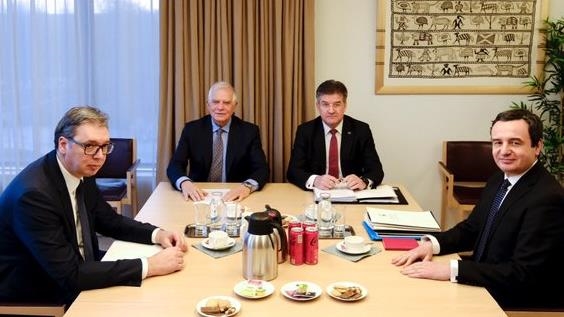Kosovo and Serbia remain unable to agree on how to ease tensions in north Kosovo’s Serb-majority areas, says EU foreign policy chief Josep Borrell. On Tuesday, Borrell warned that EU-backed efforts to stablise the situation were at risk in the event of any further escalation.
In March, Pristina and Belgrade agreed verbally to implement a Western-backed plan to improve ties. However, there has been little progress since. Some 50,000 north Kosovo-based Serbs continue their refusal to recognise Kosovo institutions ranging from police and judiciary to local municipal governments, all of which they walked away from last November. In March, they staged a boycott of local election organized by the Kosovo authorities.
This week, Borrell met with Kosovo Prime Minister Albin Kurti and Serbian President Aleksandar Vucic, and told them of his “grave concern” about the situation in north Kosovo, noting the “very low turnout” in the elections there.
Urging compromise, he cautioned the parties that further escalation could “undermine” implementation of the EU-backed deal on normalising ties.
The two leaders were unable to agree on how best to secure greater autonomy for Serb-majority municipalities, a prerequisite the Serbians set if they are to participate in Kosovo institutions.
Kurti told media that the proposed greater autonomy for Serb-majority municipalities that had been put forward at Tuesday’s meeting was a non-starter since it did not comply with Kosovo’s constitution.
Vucic, on the other hand, said it was “clear” that Pristina was not prepared “to fulfill its commitments,” citing the association of Serb municipalities.
The two sides did pledge to join forces to locate Kosovo war-era burial sites so as to identify the remains of the 1,621 still missing from the more than 13,000 who died during the 1998-99 conflict. Most of those killed and missing are ethnic Albanians.
Both parties agreed to share classified and other documents along with satellite data and other technology in their search for suspected mass grave sites.
Ethnic Albanians in Kosovo, then a province of Serbia, rejected Belgrade’s rule in 1998, starting the war that ended in June 1999 following NATO intervention. Kosovo was governed administratively by the UN. When it declared independence in 2008, Serbia refused to recognize the statehood of its former province.

